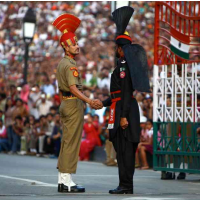Terror Hits Wagah Border – Intelligence Sharing Needed
 Indian and Pakistani security personnel shake hands at the Wagah border gate (file photo: NPR)
Indian and Pakistani security personnel shake hands at the Wagah border gate (file photo: NPR)
The Wagah border crossing between India and Pakistan is the venue of a daily military ritual at dusk that is a spectacle of chest-thumping nationalism. Yet that changed last Sunday with a suicide attack on the Pakistani side that killed 59 people.
The bomber reportedly detonated explosives in a car park 500 metres from the border gates, just as hundreds of spectators were returning from the ceremony.
"It appears the bomber wanted to target ground zero where Pakistan and India border officials stand together to perform the flag ceremony but he could not enter due to tight security on the last gate," a Pakistani intelligence official told Reuters. "Had he managed to reach the place, there would have been the worst scenario at both sides."
According to Reuters, Indian and Pakistani intelligence agencies had both picked up plans for an imminent strike on the Wagah border, and heightened security may have averted a more devastating attack.
Such an attack, especially if it had killed Indians, would have severely tested ties between the two neighbours, already frayed after weeks of shelling further along the border killed 17 people.
"The target - the border facility that symbolises trade and interaction between India and Pakistan - is a tempting one for extremist Pakistani groups that want conflict with India and oppose any detente or cooperation with New Delhi," Bruce Riedel of the Brookings Institution told Reuters.
A Pakistani police source told Reuters that a second suicide vest had been found in a field near the explosion site, suggesting there may have been another bomber.
An official from the Research and Analysis Wing (R&AW), said Sunday’s blast was aimed at Pakistan's security forces, though the media have suggested that the real target may well have been the Indian side of the border.
Another Indian official said the home ministry received two intelligence warnings in mid-October of possible attacks along the border or at the Golden Temple in Amritsar.
"Based on these reports the BSF was ordered to upgrade security and a red alert was also issued," the unnamed home ministry official told Reuters.
Yet this message was not passed on to Pakistani authorities as both countries do not share intelligence data. The time has now come for cooperation in intelligence between India and Pakistan to face terror attacks that target both countries.
Indian intelligence agencies will balk at sharing intelligence with the neighbour considered responsible for creating and nurturing anti-India terror groups. Yet a beginning will have to be made, perhaps in protecting symbolic targets of importance to both countries, such as the Wagah border crossing.
To Learn More:
Wagah Border attacker's target was India but exploded in Pakistan due to miscalculation (by Dipanjan Roy Chaudhury, Economic Times)
Spy agencies averted more deaths in Pakistan-India border bomb – sources (by Aditya Kalra and Mubasher Bukhari, Reuters)
India and Pakistan hold Wagah border ritual despite attack (BBC News)
India, Pakistan lower flag at Wagah border ceremony day after deadly attack (by Mubasher Bukhari and Aditya Kalra, Reuters)
- Top Stories
- Controversies
- Where is the Money Going?
- India and the World
- Appointments and Resignations
- Unusual News
- Latest News
- India College Chain’s Expansion into U.S. Draws Opposition from Massachusetts Officials over Quality of Education
- Milk Shortages in India Tied to Release of New Movies Featuring Nation’s Favorite Stars
- Confusion Swirls around Kashmir Newspaper Ban in Wake of Violent Street Protests
- Polio-Free for 5 Years, India Launches Vaccine Drive after Polio Strain Discovery
- New Aviation Policy Could Increase Service, Lower Ticket Prices






Comments